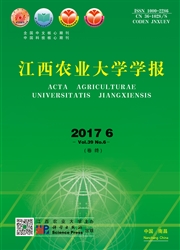

 中文摘要:
中文摘要:
通过研究光照、培养温度、培养时间、酸碱度和培养基等因素对尖角突脐孢菌孢子形成的影响,从而探明大批量生产该菌分生孢的条件和方法。结果显示,在适合的温度(25—30℃)、pH4—5、一定的培养时间(2—3周)和适当的产孢介质下,能够诱导尖角突脐孢菌形成大量的分生孢子;该菌产孢需要元素N和S,没有元素P显著降低产孢量,高C/N比和Fe不利产孢,缓效碳源玉米粉产孢效果好,缓效碳源可溶性淀粉次之;有机氮源大豆粉产孢效果最好,无机氮源中NH4NO3的产孢效果好;对合成培养基,在PDA培养基上产孢良好,沙氏和YSC(淀粉、豆粉、胡萝b汁)培养基不宜作产孢介质;该菌产孢对稗草叶汁和玉米叶汁无依赖;对农基介质,大米、稻谷、稻壳、小麦粒、高梁籽、玉米粉、玉米粒、大豆籽和大豆粉均能产孢,稻谷介质产孢效果最好,其次为大米,麦麸不能产孢。
 英文摘要:
英文摘要:
The influences of light, culture temperature, culture time,pH and culture medium on sporulation of Exserohilum monocera were studied. The highest yield of conidia was produced under the optimal conditions :temperature 25- 30 ℃, pH 4 - 5, culture time 2 - 3 wk and solid culture media. The production of conidia needed pands, whereas, adding Fe in the media significantly inhibited the production of eonidia. High ratio of C to N was beneficial for spore production. The best carbon source for sporulation media was corn flour, and the next was starch. Decreasing sucrose in the media produced more spores. The best nitrogen source was organic nitrogen soybean flour. The optimal inorganic nitrogen was NH4NO3. Spores could produce on solid substrates - polished rice, rice kernel, rice grains, wheat seeds, sorghum grains, corn grits, cornmeal, soybean seeds, and soy flour. No conidia were produced on wheat bran.
 同期刊论文项目
同期刊论文项目
 同项目期刊论文
同项目期刊论文
 期刊信息
期刊信息
